Watermelon is a popular summer fruit, and it’s important to find the best prices to ensure you’re getting the most for your money. We have gathered data from various sources to provide you with valuable information about watermelon prices.
Key Takeaways:
- Watermelon prices can vary based on store, region, season, and demand.
- Keep an eye out for sales and discounts on seedless watermelons.
- Conventional watermelons are safe to consume and usually more affordable than organic ones.
- Seeded watermelons are cheaper but harder to find compared to seedless varieties.
- Personal watermelons and pre-cut watermelon chunks may come at different price points.
Target Price for Watermelon: $1.20 per Pound or Under
When it comes to purchasing watermelons, finding the best price is essential. The target price for watermelon is $1.20 per pound or lower. By staying within this price range, you can ensure that you’re getting the best deal on this refreshing summer treat.
Regional grocery store chains like WinCo and H-E-B offer some of the best prices on watermelons. At these stores, you can find seedless watermelons priced as low as $0.58 per pound. Trader Joe’s is another option to consider, with seedless 6-pounders available for $1 per pound.
If you’re looking for discounted prices, keep an eye out for sales at stores like Walmart and Harris Teeter. These retailers often offer special deals on seedless watermelons, providing an opportunity to save even more on this delicious fruit.
Table: Best Prices for Watermelons at Select Stores
| Store | Price per Pound |
|---|---|
| WinCo | $0.58 |
| H-E-B | $0.58 |
| Trader Joe’s | $1.00 |
| Walmart | Varies by location |
| Harris Teeter | Varies by location |
By aiming for a target price of $1.20 per pound or under and taking advantage of special offers and discounts, you can enjoy watermelon without breaking the bank this summer.
Remember to check local ads and compare prices at different stores to find the best deals in your area. With a little effort and smart shopping, you can enjoy the refreshing taste of watermelon at a price that won’t leave a sour taste in your mouth!
Seasonal and Demand-Based Pricing
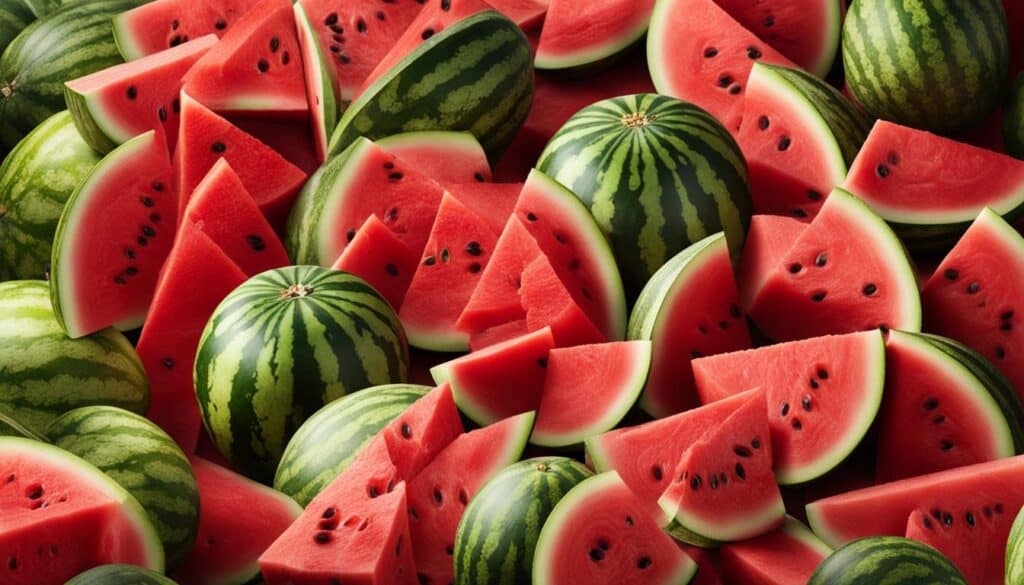
Watermelon prices can vary based on the season and demand. The peak growing season for watermelons is in July and August, which is when you can find the lowest prices due to increased supply. National holidays like the 4th of July often see price decreases as well. However, sales on watermelons can even occur as late as October, so it’s worth keeping an eye out for discounts even after the summer season.
If you live in a climate where watermelons are available year-round, you may notice fluctuations in prices depending on periods of higher or lower demand. During times when watermelon consumption is at its peak, such as during hot summer months, prices may be higher. On the other hand, during colder months or times when watermelons are less in demand, you may be able to find more affordable prices.
It’s important to keep in mind that availability and pricing may vary from region to region, as well as from store to store. Therefore, it’s always a good idea to compare watermelon prices at different locations and consider purchasing from local farmers or farmers’ markets for potentially better deals and fresher produce.
| Store | Price per Pound | Availability |
|---|---|---|
| WinCo | $0.58 | High |
| H-E-B | $0.58 | High |
| Trader Joe’s | $1.00 | Medium |
| Walmart | $1.25 | Medium |
| Harris Teeter | $1.30 | Medium |
| Whole Foods | $1.50 | Low |
As shown in the table above, WinCo and H-E-B offer the most affordable watermelon prices, while Whole Foods is on the higher end. Consider these factors when planning your watermelon purchase to get the best value for your money.
Conventional vs. Organic Watermelons
When it comes to watermelons, you have two options: conventional or organic. Understanding the differences between the two can help you make an informed decision while keeping affordability in mind.
Conventional Watermelons: Conventional watermelons are grown using traditional farming methods that may involve the use of synthetic pesticides and fertilizers. However, it’s essential to note that these substances mostly stay on the thick rind of the watermelon and do not penetrate the fruit itself. This means that conventional watermelons are generally safe to consume, even if they are not certified organic. If affordability is a key factor for you, choosing conventional watermelons is a great way to enjoy this juicy summer fruit without breaking the bank.
Organic Watermelons: On the other hand, if you prefer to prioritize organic produce, there are organic watermelons available in the market. Organic watermelons are grown without the use of synthetic pesticides or fertilizers. They are cultivated using organic farming practices, which include natural pest control methods and the use of organic fertilizers. However, it’s worth noting that organic watermelons tend to be more expensive than their conventional counterparts. Retailers like Whole Foods and Harris Teeter offer organic seedless watermelons at prices as high as $8.99 per melon or $1.50 per pound.
Choosing the Right Option for You
When deciding between conventional and organic watermelons, it ultimately comes down to personal preference and budget. If you are concerned about pesticide exposure and want to support organic farming practices, choosing organic watermelons can be a good choice. However, if affordability is your primary concern and you are confident in the safety of conventional watermelons, opting for conventional watermelons can help you save money while still enjoying the refreshing taste of this summer treat.
| Conventional Watermelons | Organic Watermelons | |
|---|---|---|
| Price Range | Average prices range from $0.31 to $0.38 per pound | Prices as high as $8.99 per melon or $1.50 per pound |
| Pesticide Use | Synthetic pesticides may be used on the rind but do not penetrate the fruit | Organic farming practices exclude the use of synthetic pesticides |
| Certification | Conventional watermelons are not certified organic | Organic watermelons are certified by the USDA |
| Availability | Widely available in grocery stores and supermarkets | Organic watermelons may have a more limited availability |
Whether you choose conventional or organic watermelons, both options can be enjoyed as part of a healthy and delicious summer diet. It’s important to wash all fruits thoroughly before consuming, regardless of their farming methods, to remove any potential surface contaminants. So, go ahead and indulge in the sweet, juicy goodness of watermelons while staying within your budget.
Seeded vs. Seedless Watermelons
When it comes to watermelons, choosing between seeded and seedless varieties can be a tough decision. Not only do they differ in taste and texture, but they also vary in price. Let’s explore the differences and considerations between seeded and seedless watermelons to help you make an informed choice.
Cost Comparison
One of the main factors that influence the decision between seeded and seedless watermelons is the price. Seeded watermelons are generally cheaper, with an average price per pound that is $1.12 lower compared to seedless watermelons. However, it’s important to note that seeded watermelons are less common and may require more effort to find.
Table: Price Comparison of Seeded and Seedless Watermelons
| Average Price per Pound | |
|---|---|
| Seeded Watermelons | $1.12 lower compared to seedless |
Availability and Popularity
Seedless watermelons have gained popularity over the years due to their convenience and ease of consumption. They have fewer seeds, making them more enjoyable to eat and ideal for snacking. As a result, seedless watermelons are more widely available in grocery stores and farmers’ markets. However, if you prefer the traditional experience of spitting out watermelon seeds or want to save some money, you may opt for seeded watermelons.
Where to Buy
When it comes to purchasing watermelons, there are various options available. Supermarkets like Walmart often offer the lowest price per ounce for seeded watermelons, making them a budget-friendly choice. However, if you’re looking for a wider selection and higher quality, local farmers’ markets or specialty stores might be your best bet.
In conclusion, the choice between seeded and seedless watermelons ultimately comes down to personal preference and budget. While seeded watermelons are generally more affordable, seedless varieties are more popular and widely available. Consider your taste preferences, budget constraints, and where you prefer to shop to determine which option is best for you.
Personal Watermelons
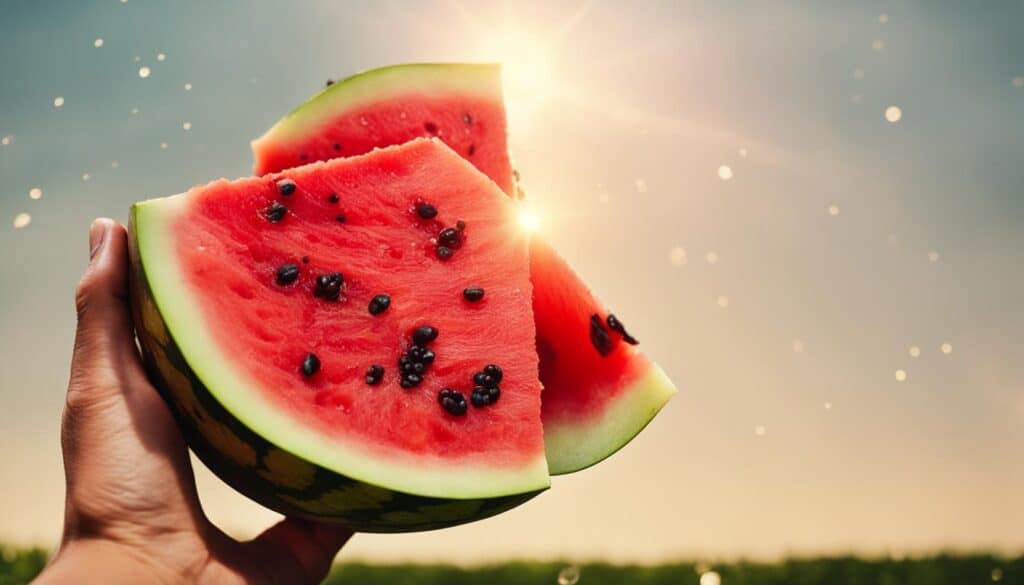
When it comes to watermelons, personal-sized options are a great choice for individuals or small households. These mini watermelons, also known as baby watermelons, are typically seedless and weigh around 3-5 pounds. Not only are they convenient in size, but they also offer a refreshing and sweet taste that is perfect for summer.
When searching for personal watermelons, it’s important to consider the price per pound to ensure you’re getting the best deal. The target price for personal watermelons is approximately $0.96 per pound. To find the most affordable options, I have compared prices at different grocery stores.
| Grocery Store | Price per Pound |
|---|---|
| WinCo | $0.89 |
| Harris Teeter | $0.99 |
| Albertsons | $1.09 |
As shown in the table above, WinCo offers the best prices for personal watermelons at $0.89 per pound. Harris Teeter follows closely with a price of $0.99 per pound, and Albertsons offers them at $1.09 per pound. Keep in mind that prices may vary depending on your location and the season.
Whether you’re looking to enjoy a personal watermelon on your own or share it with someone special, these mini watermelons are an excellent choice. Not only are they delicious and refreshing, but they also offer a great value for your money. So next time you’re at the grocery store, don’t forget to pick up a personal watermelon and savor the taste of summer.
Pre-cut Watermelon Chunks
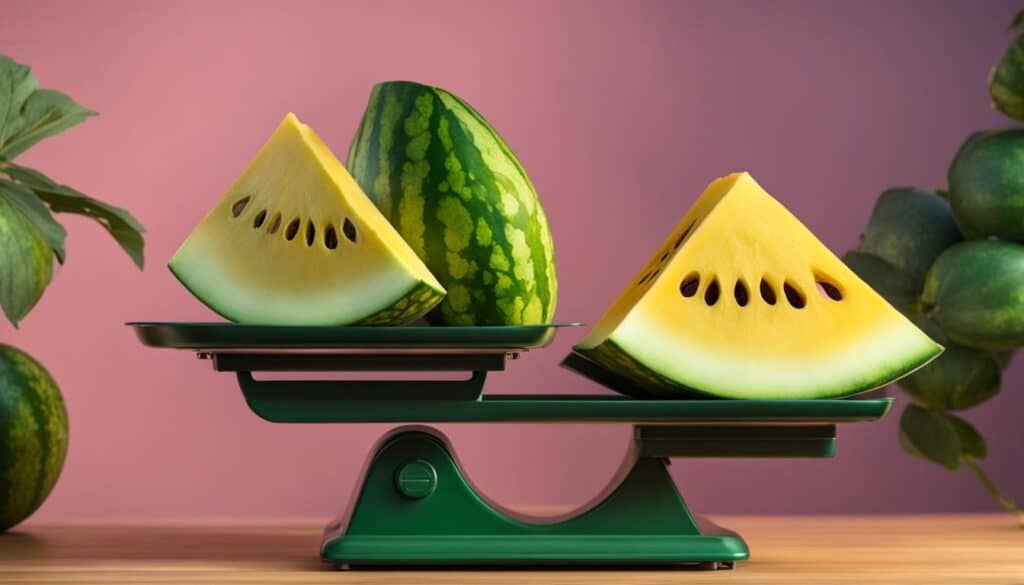
When it comes to convenience, pre-cut watermelon chunks are a popular option for those looking for a quick and ready-to-eat treat. However, it is important to consider the cost when purchasing pre-cut chunks compared to whole watermelons. The price per ounce for pre-cut watermelon chunks is typically more than three times the price of a whole seedless watermelon. While the convenience factor is undeniable, it’s essential to be mindful of your budget when making a purchase.
When comparing prices for pre-cut watermelon chunks, Harris Teeter offers the lowest price per pound. However, even with the lower price, pre-cut chunks are still significantly more expensive compared to whole watermelons. It is recommended not to pay more than $4 per pound for pre-cut chunks to ensure you’re getting an affordable price.
It’s worth noting that purchasing a whole seedless watermelon and cutting it yourself can save you money. By purchasing a whole watermelon, you have the flexibility to cut it into chunks or slices according to your preference. This way, you can enjoy the convenience of pre-cut watermelon without paying the premium price.
| Store | Price per Pound |
|---|---|
| Harris Teeter | $5.99 |
| Whole Foods | $7.99 |
| Trader Joe’s | $6.99 |
Note: Prices may vary based on location and availability.
Ultimately, the choice between pre-cut watermelon chunks and whole watermelons depends on your personal preferences and budget. If convenience is your top priority and you’re willing to pay a higher price, pre-cut chunks can be a time-saving option. However, if you’re looking for an affordable watermelon price, opting for a whole watermelon and cutting it yourself is a cost-effective alternative.
Average Watermelon Prices and Factors Affecting Them
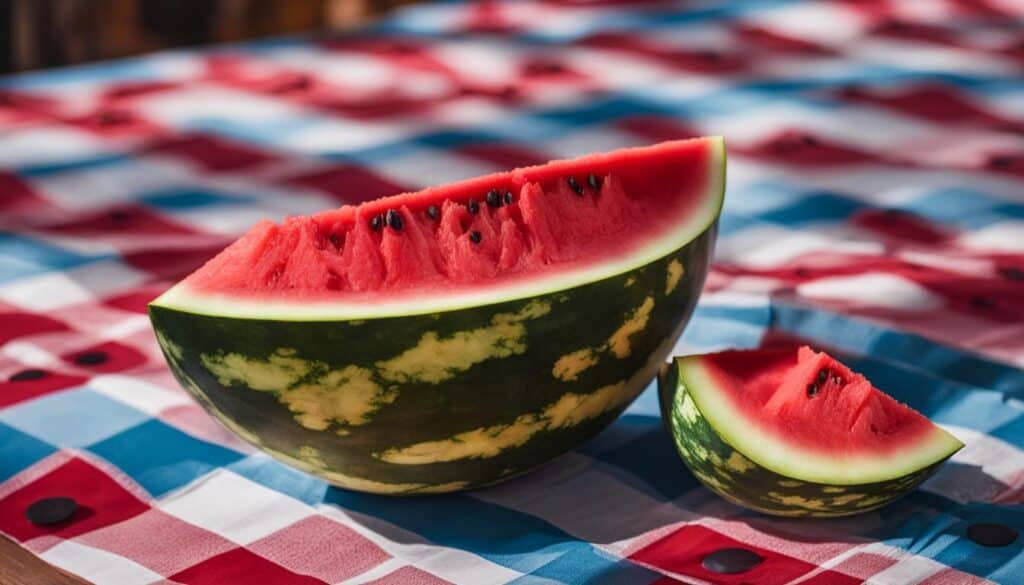
When it comes to buying watermelons, understanding the average prices and the factors that affect them can help you make informed purchasing decisions. The national average retail price for conventional seeded watermelons ranges from 31 to 38 cents per pound. However, it’s important to note that prices can vary based on location and the timing of your purchase.
One of the main factors that influence watermelon pricing is supply and demand. At the beginning of the watermelon season, prices tend to be higher as the supply is limited. However, as more crops come in, the prices gradually decrease. This is why it’s beneficial to keep an eye out for sales or consider buying directly from farmers, as they may offer better prices and fresher, sweeter watermelons.
It’s also worth mentioning that the time of year and regional factors can impact watermelon prices. The peak growing season for watermelons is in July and August when you can find the lowest prices due to increased supply. Additionally, national holidays like the 4th of July often see price decreases, as watermelons are a popular choice for summer celebrations. On the other hand, if you live in a climate where watermelons are available year-round, the cheapest time to buy may be during periods of lower demand.
Average Watermelon Prices by Region
| Region | Average Price per Pound (Conventional Seeded) |
|---|---|
| Southwest | 33 cents |
| West Coast | 35 cents |
| Midwest | 37 cents |
| Northeast | 38 cents |
| Southeast | 31 cents |
As shown in the table above, there can be regional variations in watermelon prices. The Southwest and West Coast tend to have slightly lower average prices compared to the Midwest, Northeast, and Southeast. However, it’s important to keep in mind that prices may fluctuate within each region based on local supply and demand dynamics.
By understanding the average watermelon prices and the factors influencing them, you can make better decisions when purchasing this refreshing summer treat. Whether you’re looking for the best deals at your local grocery store or considering buying directly from farmers, keeping these factors in mind will help you find the sweetest watermelons at the most reasonable prices.
Choosing a Ripe Watermelon
When it comes to selecting the perfect watermelon, there are a few key factors to consider. Follow the “Look, Lift, Turn” method to ensure you choose a ripe and delicious watermelon for your summer treat.
First, take a close look at the watermelon. It should be free of any gashes or bruises, although small scratches are acceptable. A smooth and unblemished rind is a good indication of freshness.
Next, lift the watermelon and gauge its weight. A ripe watermelon should feel heavy for its size. This heaviness indicates a high water content, which contributes to its juiciness and sweetness. If the watermelon feels light, it may be underripe.
Finally, turn the watermelon over and inspect its “ground spot.” This is the area where the watermelon was resting on the ground while growing. A creamy, buttery yellow color indicates that the watermelon is ripe and ready to be enjoyed. If the ground spot is still white or green, the watermelon may need more time to ripen.
Conclusion
Watermelon prices can vary based on the store, region, season, and demand. It is important to be aware of the average prices and target price range to ensure you’re getting a good deal. By shopping around and comparing prices, you can find the best deals on watermelons.
One strategy is to look for sales and discounts, especially during the peak growing season of July and August. Many grocery stores offer discounted prices on watermelons during national holidays like the 4th of July. Additionally, consider buying directly from farmers, as this can result in better prices and fresher, sweeter watermelons.
Remember to keep an eye out for seedless watermelons, which are the most popular type but can be more expensive than seeded varieties. If you’re on a budget, consider buying seeded watermelons or personal watermelons, which are smaller and usually more affordable.
With these tips in mind, you can enjoy your summer treat without breaking the bank. So go ahead, grab a refreshing watermelon, and savor the sweet taste of summer!
FAQ
What is the ideal price range for watermelon?
The ideal price range for watermelon is $1.20 per pound or lower.
Where can I find the best deals on watermelons?
Regional grocery store chains like WinCo and H-E-B offer the best deals, with prices as low as $0.58 per pound. Trader Joe’s is also a good option, with seedless 6-pounders priced at $1 per pound. Walmart and Harris Teeter often offer discounted prices on seedless watermelons.
Do watermelon prices vary based on the season and demand?
Yes, watermelon prices can vary based on the season and demand. The lowest prices are typically found during the peak growing season in July and August. National holidays like the 4th of July often see price decreases. Sales can even occur as late as October. If you live in a climate where watermelons are available year-round, the cheapest time to buy is during periods of lower demand.
Are conventional watermelons safe to consume?
Yes, conventional watermelons are generally considered safe to consume. The thick rind of watermelons prevents pesticides from reaching the fruit, making them a safe option for all consumers.
Where can I find organic watermelons?
Whole Foods and Harris Teeter offer organic seedless watermelons at $8.99 per melon or $1.50 per pound.
Are seeded watermelons cheaper than seedless watermelons?
Yes, seeded watermelons are typically cheaper than seedless watermelons, with prices averaging $1.12 per pound lower. However, seeded watermelons are harder to find as seedless varieties are more popular.
Where can I find personal watermelons?
WinCo, Harris Teeter, and Albertsons offer the best prices for personal watermelons, which are usually seedless and weigh around 3-5 pounds.
How much do pre-cut watermelon chunks cost?
Pre-cut watermelon chunks are convenient but come at a higher cost. The price per ounce is typically more than three times the price of a whole seedless watermelon. Harris Teeter offers the lowest price per pound for pre-cut watermelon chunks, but it is still significantly more expensive compared to whole watermelons. It is recommended not to pay more than $4 per pound for pre-cut chunks.
What is the national average retail price for conventional seeded watermelons?
The national average retail price for conventional seeded watermelons is between 31 to 38 cents per pound. However, prices can vary based on location and the timing of the purchase.
How can I choose a ripe watermelon?
When selecting a ripe watermelon, it is best to use the “Look, Lift, Turn” method. Look for watermelons that are free of gashes and bruises, although scratches are acceptable. Lift the watermelon and ensure it feels heavy for its size, indicating a high water content. Finally, turn the watermelon over and check the color of its “ground spot.” A creamy, buttery yellow color indicates ripeness.

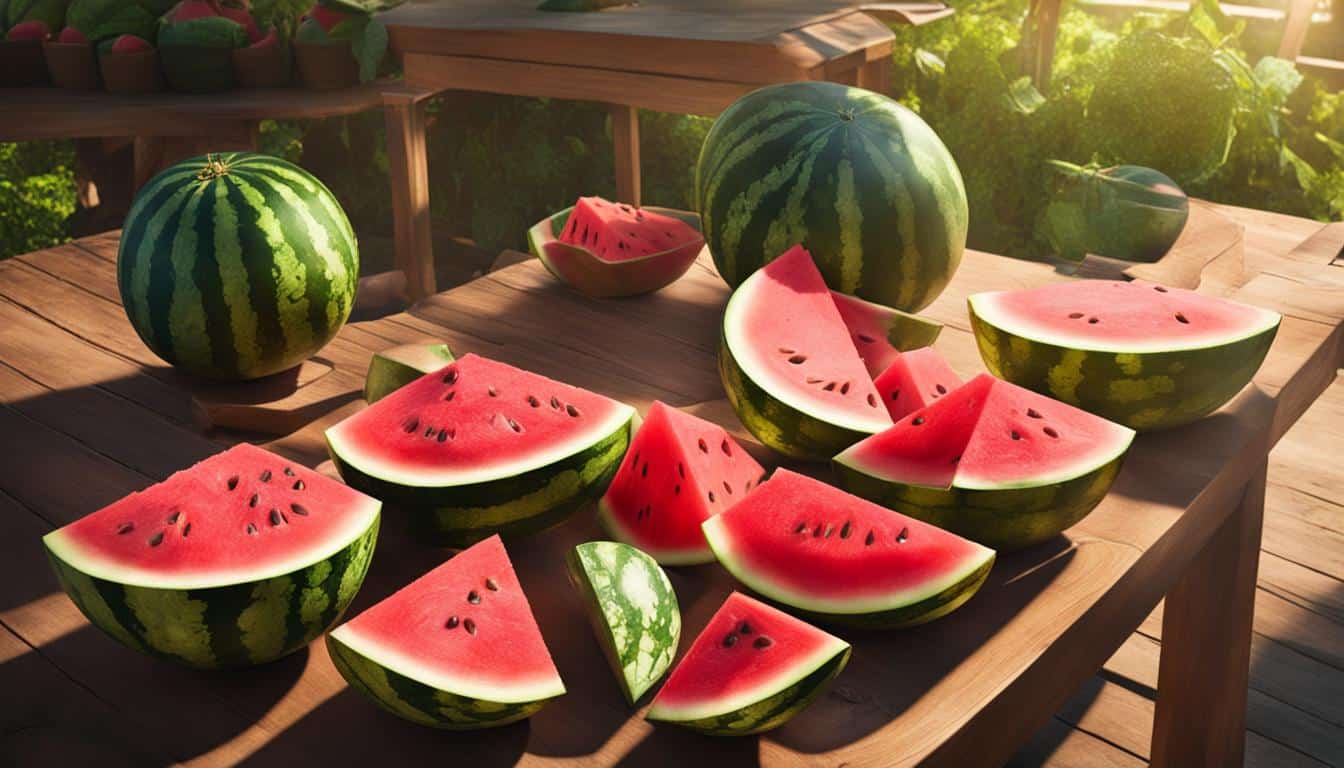



Leave a Reply